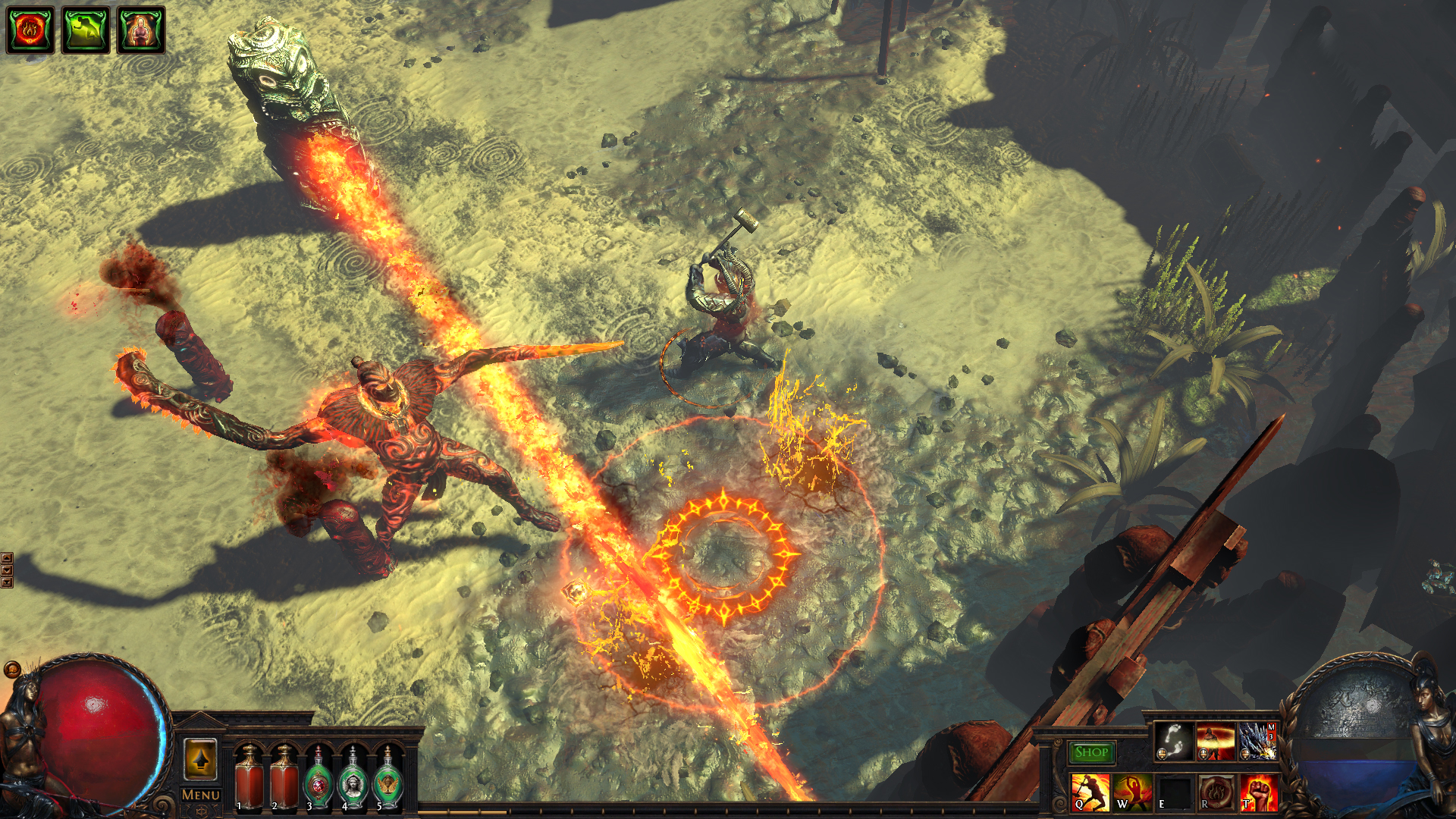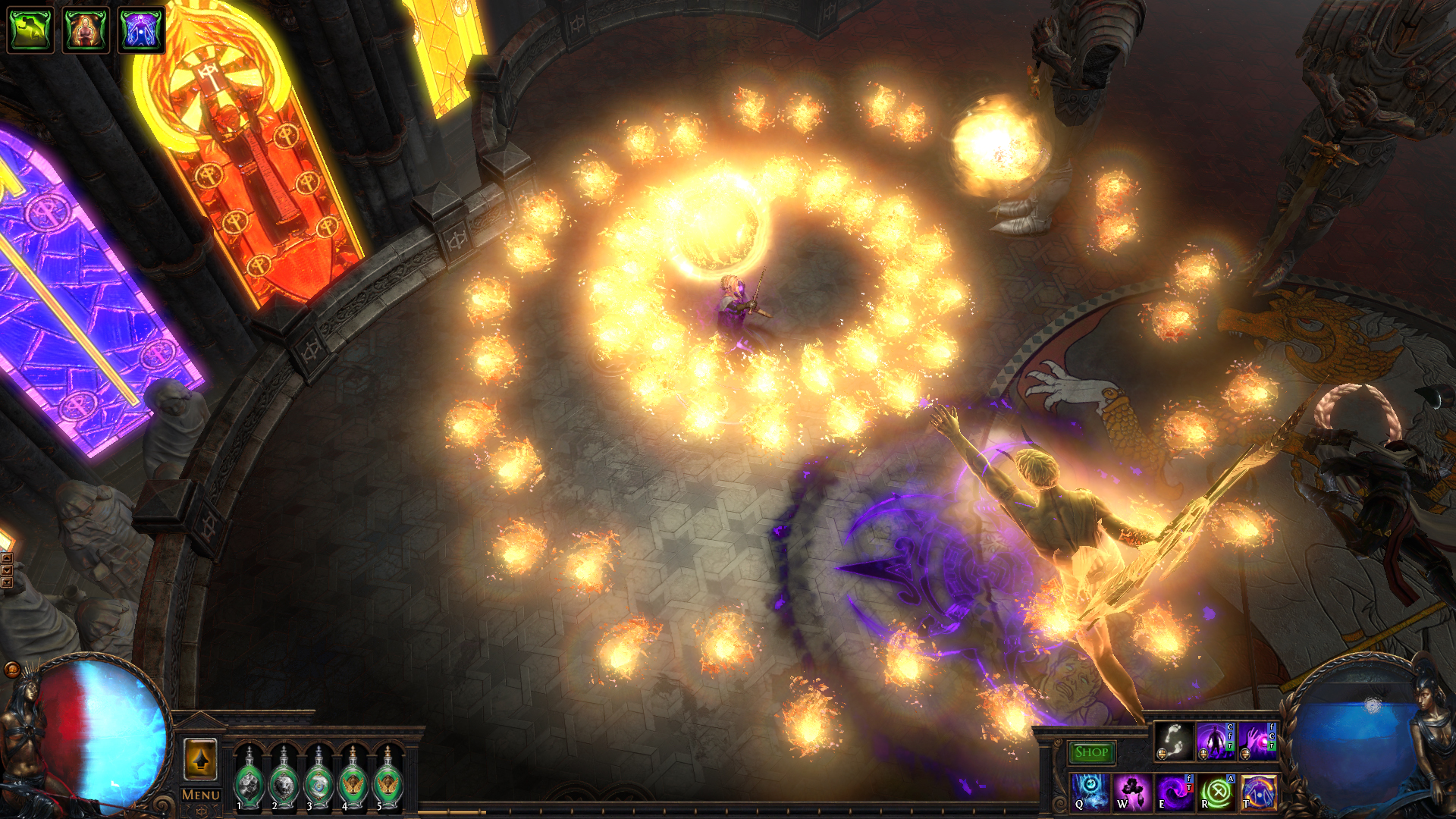Path of Exile is the king of ARPGs, but only if you can learn to love its complexity
How I learned to stop worrying and love the grind.

There is a darkness that enshrouds Path of Exile. No, I'm not talking about the dank crypts and black mausoleums I stalk through, clicking madly on my never ending quest for loot. I'm talking about the seemingly impenetrable shadow of complexity that hangs over it, that feeling of total confusion as yet another esoteric system is introduced without any idea what it's for or how it will help my character become more powerful.
In the four years since Path of Exile was first released, I have tried to play it countless times. I start a new character and, before long, abandon them because I feel overwhelmed by the sheer intricacy—the commodity-based economy, freeform character progression, and the always nagging feeling that I'm playing it the wrong way. But with the release of its massive Fall of Oriath expansion a month ago, I decided to try once more, and I have finally seen the light. Path of Exile isn't an easy game to get into, but if you stick with it, you'll discover the most richly rewarding ARPG out there.
Lost in Wraeclast
Path of Exile is a theory crafter's dream come true, the kind of game with seemingly endless ways to build and optimize your ideal character. On top of a standard leveling system is a passive skill tree that makes Final Fantasy 10's Sphere Grid look like a 'connect the dots' puzzle book for toddlers—and that's just the beginning. There's an Ascension system for further specializing your character, a Pantheon system which gives you more passive bonuses for killing various gods and trapping their souls, the skill gems which lets you essentially spellcraft—the list goes on. And on. And on.
Oh, and I haven't even mentioned loot. Good lord, the loot. Never have I been so haunted by an inventory full of obscure knick-knacks and gizmos that I know do something but have no clue if that something is even worth doing. If you're someone who likes understanding the fundamental concepts of a game right away, Path of Exile can feel impossible.
If you're someone who likes understanding the fundamental concepts of a game right away, Path of Exile can feel impossible.
To be clear, The Fall of Oriath, the latest expansion, fixes none of this. Not directly, anyway. The biggest feature is the addition of six excellent new acts, but you'll need to have persevered through the original four to even experience them. A new in-game tutorial will walk you through some of the basics in more detail, but I felt like it more often told me how to interact with a system without telling me how I should use it. As someone who recently returned to Diablo 3 to play as a Necromancer, the contrast couldn't have been more stark. And yet I've sunk about 40 hours into Path of Exile this month while Diablo 3 is, again, gathering dust.

Pushing through the fog
The biggest problem I had when first trying to play Path of Exile was feeling paralyzed with freedom. Where Diablo 3 offers structured character classes, Path of Exile's classes are almost inconsequential. Sure, you can start as a Witch, but nothing is stopping you from investing all your points into strength and turning her into a sledgehammer-wielding melee maniac.
Veterans will tell you to just wing it the first time, but I'm not fond of the idea of investing 20 hours into some rickety-shit build only to have to undo those mistakes later. But looking at various build guides, they're often steeped in lingo that can be impossible to interpret. Here's an excerpt from a popular build I found on Google.
Keep up to date with the most important stories and the best deals, as picked by the PC Gamer team.
"THIS BUILD IS MADE FOR BOSSING, NOT VSPARK SPEED MAPPING, SO KEEP THAT IN MIND."
General guides aimed straight at newbies can be a huge help, but even those feel a bit overwhelming. Here's a fantastic guide by Zizaran that clocks in at a whopping 43 minutes. But surely there must be a quick set of tips for new players who just want to kill monsters and not spend hours researching? There is. Sort of.
One of the great things about Fall of Oriath's launch (which brings Path of Exile up to version 3.0) is that sweeping balance changes and new skills means the entire metagame has been thrown out. The community has created a ton of new builds to play with. After doing some searching, I came across YouTuber Engineering Eternity who has fantastic beginner build guides. Though there's still some jargon to learn, Engineering Eternity solves one of the biggest problems with many guides I read by walking you through the leveling process. Instead of just showing you what the build will look like in the endgame, he breaks the guide into major leveling milestones, giving you smaller, more digestible goals to work toward.
I went with his Scorching Ray Necromancer build, which revolves around melting enemies under a blast of fire and letting its damage over time ability finish them off while I move on to the next group. It's an excellent build that I recommend anyone use because it isn't overly reliant on gear. I still felt confused but I finally had a lantern that could at least illuminate the next few steps I had to take. That made Path of Exile much more accessible, and I started to see why it has such zealous fans.
The joy of synergy
One of the best concepts in Path of Exile is its passive tree and skill gems. Each time you level up, you unlock points which you can use to unlock nodes in the passive skill tree. Minor nodes offer slight upgrades to your stats, while major nodes unlock powerful passive skills that fundamentally change how you play.
This works in concert with skill gems, which slot into pieces of equipment and give your character spells and abilities to use in combat (unlike Diablo 3, they don't have any given abilities). Items will often have multiple gem slots, and sometimes they're linked together. If I put an ability like Orb of Storms into a slot and then link it with Curse on Hit, Flammability and Vulnerability, each time my Orb of Storms hits an enemy it'll also apply both of those curses to them. It's essentially a highly robust spell-crafting system.
But it's when skill gems and the passive tree overlap that things get really exciting. My Necromancer relies solely on Scorching Ray to deal damage. Naturally, I've unlocked plenty of nodes that increase fire damage, but a few major nodes have these clever synergies that are really fun to unlock. Take Elemental Equilibrium for example, which makes enemies I hit with elemental damage temporarily receive 25 percent resistance to those elements and -50 percent resistance to other elements.
How could that be useful to me? Well, when an enemy is hit by Orb of Storms, they become more resistant to lightning damage but weaker to fire. And because Scorching Ray is a damage over time ability, it doesn't actually "hit" an enemy, so I never risk making them more resistant to fire by accident. That's just one of a dozen small synergies my character has. I've never been much of a theory crafter, but seeing my build slowly come together as I unlock more major nodes has been a rewarding experience.
Seeing my build slowly come together as I unlock more major nodes has been a rewarding experience.
Path of Exile's core combat will never be as satisfying as Diablo 3's. It's slower and lacks the same kinetic energy as monsters ragdoll and the environment crumbles from your attacks. But what it lacks in animation and action, it makes up for in spades with the strategic depth that comes from slowly molding a character from such a robust system. I don't feel nearly as attached to any of my Diablo characters because I feel like I've invested so much time into intimately understanding how my Witch works. She feels handcrafted even though I built her from a template. And with her passive tree nearly complete and a good deal of her skills in place, she burns through packs of monsters with tremendous ferocity. It's like booting up a new PC build for the first time, hearing it whir to life and wanting to shout "It's alive!"
Flipping the switch
Once I embraced Path of Exile's sprawling complexity, the dominos of my apprehension began to fall. I wanted to learn more about the game because I understood that its complexity is actually a virtue. The other day I spent an hour on the wiki finding out where I can get the rest of the skill gems I need to complete my build, and there's a few dozen other long term goals I'm beginning to work towards. Like a good MMO, I'm excited about the journey instead of the destination. And that's another reason why Diablo 3's Necromancer, despite being a lot of fun to play, never hooked me for longer than a few days. Within an hour or two, I had power levelled him to 70, but I didn't feel any connection with the progress I had made.

Now that I've learned to enjoy Path of Exile's core game, I'm also beginning to appreciate Path of Oriath. As I mentioned, it introduces six new acts for a total of ten. This replaces the genre-standard difficulty system, where I'd normally play through the same content again and again at higher difficulties. Instead, Path of Exile is now one massive adventure. Technically four of the new acts are a retread through familiar zones, but there's constant detours to new areas and dramatic changes to the scenery to keep things interesting. Beyond that, there's a whole endgame to look forward to, but I'm not sure if I'll even get there. I've already been reading other build guides and I'm itching to try something new, to experience that slow transformation from weakling to god-like but with a new playstyle.
Path of Exile is a huge game to try and comprehend. There's still dozens of systems I don't understand and an inventory full of items I don't quite know how to use. But it has rekindled the power fantasy that ARPGs have always fundamentally been about. One that, for me, has largely remained dormant since those sleepless nights playing Diablo 2.
With over 7 years of experience with in-depth feature reporting, Steven's mission is to chronicle the fascinating ways that games intersect our lives. Whether it's colossal in-game wars in an MMO, or long-haul truckers who turn to games to protect them from the loneliness of the open road, Steven tries to unearth PC gaming's greatest untold stories. His love of PC gaming started extremely early. Without money to spend, he spent an entire day watching the progress bar on a 25mb download of the Heroes of Might and Magic 2 demo that he then played for at least a hundred hours. It was a good demo.


